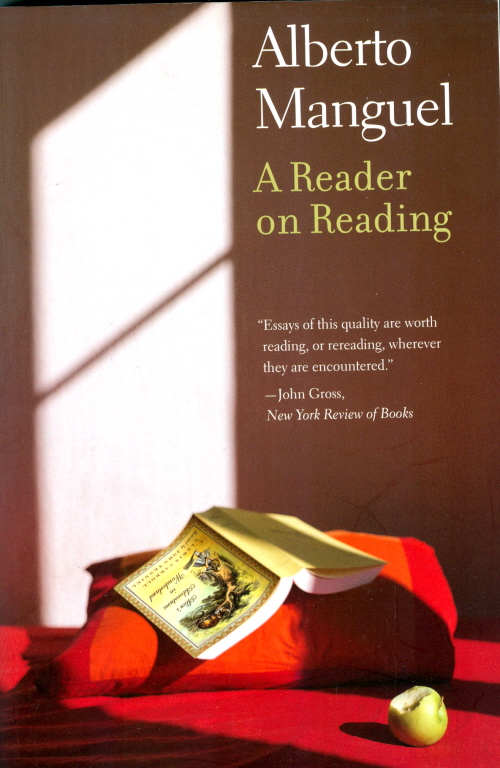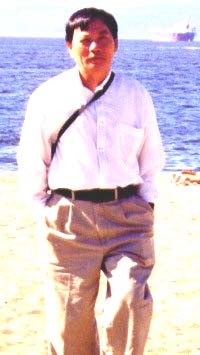
Cuốn mới ra
lò của AM, trong có nhiều bài đã xb thành sách, nay in chung thành tập.
Alberto
Manguel cũng dân Canada. GCC biết ông ngay những ngày đầu qua xứ lạnh,
gặp NTV
và anh giới thiệu Chuyện Đọc, "A History of Reading", thật tuyệt đã
từng được giải
Medicis của Tây.
Một tay mọt sách. Cách đọc của ông, [có thể ảnh hưởng tới
GCC], là đọc quanh, đọc xoáy về Lò Thiêu.
Đã từng được Borges xoa đầu, cho làm kẻ
đọc sách cho ông, khi ông bị mù.
TV giới thiệu
bài viết ngắn của ông, trong cuốn trên
Ghi
chú về định nghĩa về 1 vị độc giả lý tưởng
"Let's
hear it," said Humpty Dumpty. "I can explain all the poems that ever
were invented - and a good many that haven't been invented just yet."
Through the
Looking-Glass, Chapter 6
Ta có thể giải
thích tất cả những bài thơ đã từng được viết ra - và khá nhiều bài chưa
được viết.
GCC mà chẳng
đã từng bốc phét, đọc nửa cuốn sách, coi nửa cuốn phim, là đã
đoán ra
phần còn lại?
THE IDEAL READER IS THE writer
just before the words come together
on the page.
The ideal reader exists in the moment that precedes the moment of
creation.
Ideal readers do not reconstruct a story: they re-create it. Ideal
readers do not follow a story: they partake of it.
A famous children's book program on the BBC always started with
the host asking, ''Are you sitting comfortably? Then we shall begin."
The
ideal reader is also the ideal sitter.
Depictions of Saint Jerome show him poised over his translation of
the Bible, listening to the word of God. The ideal reader must learn
how to
listen.
Độc giả
lý
tưởng là nhà văn đúng ngay trước khi những con chữ bò ra tấp nập, rộn
ràng, trên
trang giấy.
Độc giả lý
tưởng hiện hữu vào khoảnh khắc liền trước khoảnh khắc sáng tạo.
Những độc giả
lý tưởng không tái xây dựng một câu chuyện: Họ tái-sáng tạo nó. Những
độc giả lý
tưởng không theo dõi một câu chuyện: Họ tham dự vô nó.
Một chương
trình cho trẻ em của đài BBC luôn bắt đầu bằng câu của người chủ chương
trình: “Các
em ngồi thoải mái chưa? Nếu rồi thì chúng
ta bắt đầu”. Độc giả lý tưởng thì cũng y chang người ngồi lý tưởng.
Những nét mô
tả Saint Jreome cho thấy người ở trong một tư thế đĩnh đạc trong khi
diễn dịch
lời của Chúa. Độc giả lý tưởng phải học, làm thế nào lắng nghe.
Notes
Towards a Definition of the Ideal Reader
"Let's
hear it," said Humpty Dumpty. "I can explain all the poems that ever
were invented - and a good many that haven't been invented just yet."
Through the
Looking-Glass, Chapter 6
THE IDEAL
READER IS THE writer just before the words come together on the page.
The ideal
reader exists in the moment that precedes the moment of creation.
Ideal
readers do not reconstruct a story: they re-create it.
Ideal readers do
not
follow a story: they partake of it.
A famous
children's book program on the BBC always started with the host asking,
''Are
you sitting comfortably? Then we shall begin." The ideal
reader is also
the ideal sitter.
Depictions
of Saint Jerome show him poised over his translation of the Bible,
listening to
the word of God. The ideal reader must learn how to listen.
The ideal
reader is the translator, able to dissect the text, peel back the skin,
slice
down to the marrow, follow each artery and each vein, and then set on
its feet
a whole new sentient being. The ideal reader is not a taxidermist.
For the
ideal reader all devices are familiar.
For the ideal reader all jokes
are new.
"One
must be an inventor to read well." Ralph Waldo Emerson.
The ideal
reader has an unlimited capacity for oblivion and can dismiss from
memory the knowledge
that Dr. Jekyll and Mr. Hyde are one and the same person, that Julien
Sorel
will have his head cut off, that the name of the murderer of Roger
Ackroyd is
So-and-so.
The ideal
reader has no interest in the writings of Bret Easton Ellis. The ideal
reader
knows what the writer only intuits.
The ideal
reader subverts the text. The ideal reader does not take the writer's
word for
granted.
The ideal
reader is a cumulative reader: every reading of a book adds a new layer
of
memory to the narrative.
Every ideal
reader is an associative reader and reads as if all books were the work
of one
ageless and prolific author.
Ideal
readers cannot put their knowledge into words.
Upon closing
the book, ideal readers feel that, had they not read it, the world
would
be poorer.
The ideal
reader has a wicked sense of humor. Ideal readers never count their
books.
The ideal
reader is both generous and greedy.
The ideal
reader reads all literature as if it were anonymous. The ideal reader
enjoys
using a dictionary.
The ideal
reader judges a book by its cover.
Reading a
book from centuries ago, the ideal reader feels immortal. Paolo and
Francesca
were not ideal readers since they confess to Dante that
after
their first kiss they read no more. Ideal readers would have kissed and
then
read on. One love does not exclude the other.
Ideal
readers do not know they are ideal readers until they have reached the
end of
the book
The ideal
reader shares the ethics of Don Quixote, the longing of Madame Bovary,
the lust
of the Wife of Bath, the adventurous spirit of Ulysses, the mettle of
Holden
Caulfield, at least for the space of the story.
The ideal
reader treads the beaten path. "A good reader, major reader, an active
and
creative reader is a re-reader." Vladimir Nabokov.
The ideal
reader is polytheistic.
The ideal
reader holds, for a book, the promise of resurrection. Robinson Crusoe
is not
an ideal reader. He reads the Bible to find answers.
An ideal
reader reads to find questions.
Every book,
good or bad, has its ideal reader.
For the
ideal reader, every book reads, to a certain degree, as an
autobiography.
The ideal
reader has no precise nationality.
Sometimes a
writer must wait several centuries to find the ideal reader. It took
Blake ISO
years to find Northrop Frye.
Stendhal's
ideal reader: "I write for barely a hundred readers, for unhappy,
amiable,
charming beings, never moral or hypocritical, whom I would like to
please; I
know barely one or two."
The ideal
reader has known unhappiness.
Ideal
readers change with age. The fourteen-year-old ideal reader of Pablo
Neruda's
Twenty Love Poems is no longer its ideal reader at thirty. Experience
tarnishes
certain readings.
Pinochet,
who banned Don Quixote because he thought it advocated civil
disobedience, was
that book's ideal reader.
The ideal
reader never exhausts the book's geography.
The ideal
reader must be willing, not only to suspend disbelief, but to embrace a
new faith.
The ideal
reader never thinks, "If only ... " Writing on the margins is a sign
of the ideal reader. The ideal reader proselytizes.
The ideal
reader is guiltlessly whimsical.
The ideal
reader is capable of falling in love with one of the book's characters.
The ideal
reader is not concerned with anachronism, documentary truth, historical
accuracy, topographical exactness. The ideal reader is not an
archaeologist.
The ideal
reader is a ruthless enforcer of the rules and regulations that each
book
creates for itself.
"There
are three kinds of readers: one, who enjoys without judging; a third,
who
judges without enjoying; another in the middle, who judges while
enjoying and
enjoys while judging. The last class truly reproduces a work of art
anew; its
members are not numerous." Goethe, in a letter to Johann Frieddrich
Rochlitz.
The readers
who committed suicide after reading Werther were not ideal but merely
sentimental readers.
Ideal
readers are seldom sentimental.
The ideal
reader wishes both to get to the end of the book and to know that the
book will
never end.
The ideal
reader is never impatient.
The ideal
reader is not concerned with genres.
The ideal
reader is (or appears to be) more intelligent than the writer; the
ideal reader
does not hold this against the writer.
There comes
a time when every reader considers himself to be the ideal reader.
Good
intentions are not enough to produce an ideal reader.
The marquis
de Sade: "I only write for those capable of understanding me, and
these will read me with no danger."
The marquis
de Sade is wrong: the ideal reader is always in danger. The ideal
reader is a
novel's main character.
Paul Valery:
''A literary ideal: finally to know not to fill the page with anything
except
'the reader.'''
The ideal
reader is someone the writer would not mind spending an evening with,
over a
glass of wine.
An ideal
reader should not be confused with a virtual reader. Writers are never
their
own ideal reader.
Literature
depends, not on ideal readers, but merely on good enough readers.

